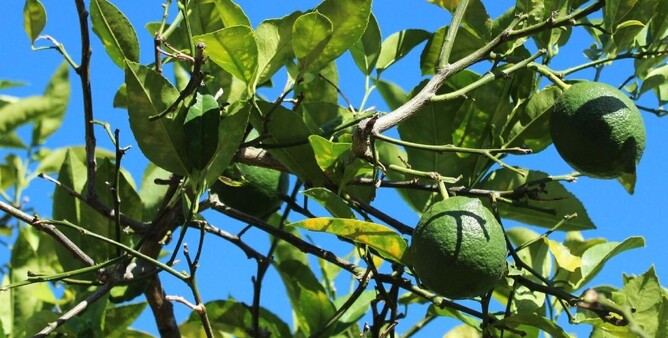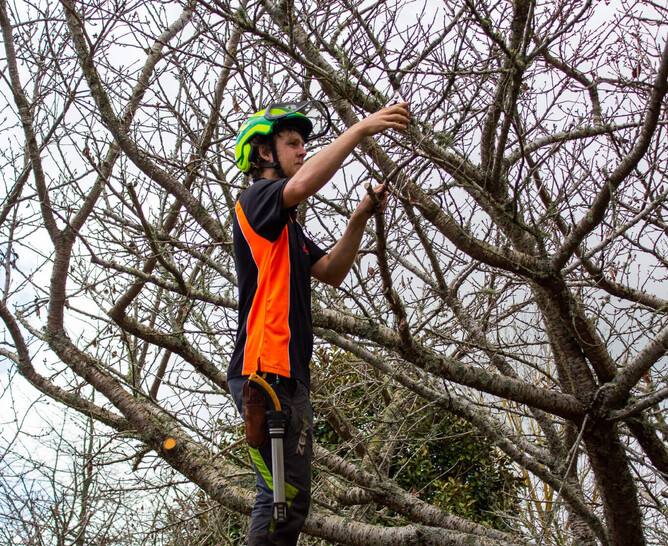It’s that time of the year again that everyone in New Zealand dreads. The mornings are colder; the days are getting shorter, and summer is almost gone.
Autumn is a significant time since we get many enquiries to prune multiple trees around Hamilton. It’s great that so many of our regular clients know when to prune fruit trees. We thought it would be great to also bring more awareness to everyone in our community by creating this guide.
To learn more about pruning fruit trees, get familiar with why it is essential, the best fruit trees to plant, the best time of the year to prune and more.
Why Pruning Is Important
Pruning fruit trees is essential to create the desired shape from a young to a mature tree. When pruning, arborists remove dead or diseased branches and stems. Removing unwanted limbs will allow more sunlight and air movement into the tree. Opening up the canopy will then increase foliage while decreasing disease risk. In addition, pruning promotes flowering and fruiting. Therefore, it encourages fresh new stems and will increase the fruit harvest.
Pruning is crucial in tree maintenance to obtain a better-looking and performing tree. If you are new to pruning or have many fruit trees on your property, we recommend contacting our team to ensure you get the best advice.
Best Time To Prune Fruit Trees
The best time to prune fruit trees is at the end of autumn. It also needs to be on a dry day when it isn’t raining. The risk of silver leaf, a disease that causes leaves of woody trees and shrubs to turn silvery, is heightened.
We suggest contacting us at the end of summer or early autumn to get a quote for pruning your trees. This will ensure you are booked at the right time of the year to get your fruit trees pruned. So, think ahead of time because our pruning calendar books out fast.
What Fruit Trees Should I Plant?
If you live in Hamilton, New Zealand, we recommend planting the following fruit trees as they will give you the best results:
Apple tree
Pear tree
Plum tree
Citrus tree
Feijoa tree
Fig tree
Persimmons tree
We tend not to recommend planting apricot, peach and nectarine trees in the Waikato as we don't have the ideal climate. In our experience, we find it a little too humid for good results.
If you live in another region, we suggest you do some research or talk to your local nursery before purchasing a fruit tree to check if it will survive in your region's climate.
3 Stages Of Fruit Tree Pruning
From when you plant a new tree to when it matures, pruning is vital for the tree’s healthy growth. The three essential stages of pruning a tree are the following.
1. Young Form
Removing unwanted leaders is essential during the earliest stages of a tree’s life. Once done, you leave it alone for two or three years. In addition, a young tree can be vulnerable to predators. So adding a little fence around the tree can protect it from animals.
2. Formative Form
The next step of pruning fruit trees is formative pruning. Arborists will prune the tree to a well-formed vase shape with one central leader. This framework of the tree is the one that it will have for the rest of its life. Anything weak or damaged needs to be removed.
3. Fruiting Form
The tree will be ready to fruit once the limbs are strong. Although, it will vary with all fruit trees. Some can take longer to grow than others. For example, an apple takes three years to grow on a three-year-old limb. So, when you prune one part of a one to two-year-old branch, the fruit will grow in one or two years. As for plums and nectarine, it only takes one year for the fruit to grow.
The tree needs to be pruned appropriately to get the best result and have good-quality fruit.
Preparing your fruit trees for winter is crucial. They benefit from pruning to create a robust framework of limbs to support a heavy crop. Remember, don’t take it for granted that your fruit tree will give some more without pruning it properly.
Get in touch with us now for a quote and advice.

